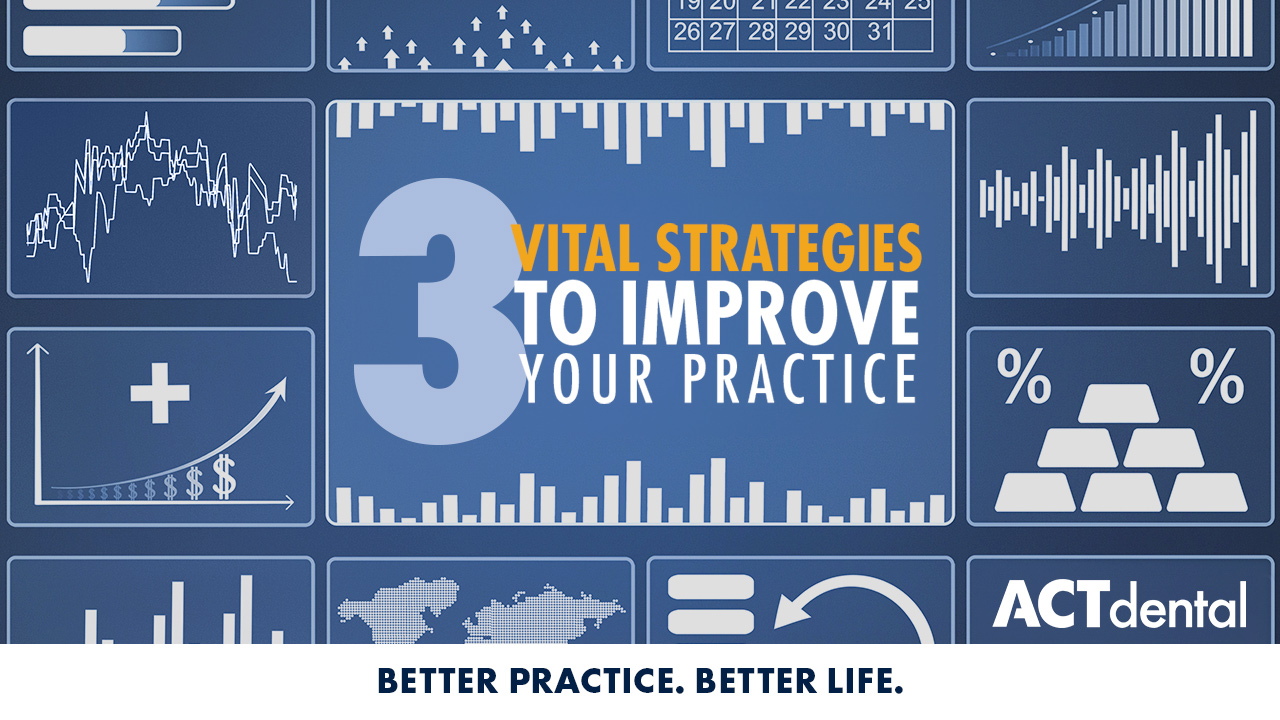Anyone who seeks to create a better practice cannot do so without one critical piece of the puzzle: data. To make truly informed decisions about the business, you need to make evidence-based decisions—just as you do clinically—not emotional decisions. Data isn’t concerned with feelings but honest, tangible results, and it will tell you when it’s time to correct the course. It’s not the bad guy, just the facts, and it’s essential to learn to track your data so you can use it to reach your goals!
To help you on this journey, here are three strategies you can apply to your practice to start helping your data work for you:
1. Know What to Track
Understanding where to begin is often the most challenging step, especially because so many outside influences tell you what your goals should be. Instead of getting hung up on them, focus on your stated goals and what progress looks like for you and your team. From there, you must start tracking the KPIs to help you reach those goals. A critical final step is to report on those KPIs monthly and weekly with your team. After all, like Kirk says, “What gets measured improves. But what gets measured and reported on improves exponentially.”
2. Know What it Means
A crucial component of this process is understanding what it all means, specifically your leading and lagging indicators. Your lagging indicators are the KPIs that tell you how you did, and include the following:
- Production
- Collection
- Number of new patients
Leading indicators, however, help to predict how you will do. Some examples are:
- Scheduled production
- Restorative and Periodontal Diagnosis and Acceptance Percentage
- Hygiene Reappointment percentage
These KPIs help you determine where and when to correct and implement the proper countermeasure, ultimately affecting your lagging indicators.
3. Know When to Course Correct
When you know what to track and understand what it means, you can start making course corrections and working on the practice. Working on the practice means more than just working in it, and I recommend holding weekly team meetings to do so. A two-hour weekly meeting gives you an advantage regarding course correction halfway through the month because you can quickly implement countermeasures. Spend the first hour of the meeting reporting on your KPIs, and if you notice you’re off-track for one, you can put it on an issues list. Then, you can discuss these issues and the countermeasures you can use to turn them around by the end of the month.
Remember, you don’t have to (and shouldn’t!) do this by yourself. Bring your team into the know and equip them with the skills to track and report on the KPIs—they’ll be an incredible tool, making your weekly meetings much more productive. And, of course, reach out to ACT; we’re happy to help you achieve your goals! Contact Gina to learn more, or see us in person at our April To The Top Study Club sessions!
Tune in next time and learn about two tools you can use to hold your data accountable!
Christina Byrne is the Operations Director at ACT Dental
Kirk Behrendt
Kirk Behrendt is a renowned consultant and speaker in the dental industry, known for his expertise in helping dentists create better practices and better lives. With over 30 years of experience in the field, Kirk has dedicated his professional life to optimizing the best systems and practices in dentistry. Kirk has been a featured speaker at every major dental meeting in the United States. His company, ACT Dental, has consistently been ranked as one of the top dental consultants in Dentistry Today's annual rankings for the past 10 years. In addition, ACT Dental was named one of the fastest-growing companies in the United States by Inc Magazine, appearing on their Inc 5000 list. Kirk's motivational skills are widely recognized in the dental industry. Dr. Peter Dawson of The Dawson Academy has referred to Kirk as "THE best motivator I have ever heard." Kirk has also assembled a trusted team of advisor experts who work with dentists to customize individual solutions that meet their unique needs. When he's not motivating dentists and their teams, Kirk enjoys coaching his children's sports teams and spending time with his amazing wife, Sarah, and their four children, Kinzie, Lily, Zoe, and Bo.
RECENT POSTS
876: The Kois-Coachman Digital Dentistry Event & The IntraOral Scanner Festival – Dr. Christian Coachman
April 18, 2025
Rest Isn't A Reward, It's A Requirement!
April 14, 2025
Data Snapshot: # of Office Days Open
April 11, 2025
Weather Any Storm: The Power of Focus
April 07, 2025
871: Metric Mondays: Gross Profit Percentage: The Health Indicator of Your Practice – Dr. Barrett Straub
April 07, 2025
Embrace Conflict to Unlock Trust
April 04, 2025

